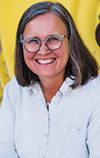I want you to explore some new learning and consider signing up for a virtual mental health first-aid course. It’s easy to do, costs less than $150 and will give you more confidence to have supportive conversations with your family, friends and the neighbor down the road who needs a listening ear.
Many longtime readers of this column will recall that I am a postpartum depression survivor who spent a good chunk of 1984 in a psychiatric ward healing after 23 ECT treatments, as I was drug-resistant to therapy. I also have walked the mental health journey with many family members and friends over the past 37 years, yet I knew I needed a solid framework in 2021 to be supportive and courageous.
My instructor was Ashley Breland, a social worker from the University of Saskatchewan who is working on her master’s degree in social work. Her energy, enthusiasm and honest vulnerability of her own mental wellness journey gave all of us on the online training the permission to share parts of our own heavy stories briefly in our breakout groups. We learned to confirm the skills of approaching conversations, listening without judgment and being careful to use language of empathy, not sympathy.
A farm family coach hears many heavy stories as families approach me for ways to get traction on their transition planning and have smoother conversations. If you are a supportive person who gives and gives, you may be entering 2022 in a depleted state. Breland’s training also emphasized the need for self-care when you are nurturing and being a supportive listener to people who are struggling with mental health storms (everyday life) or the more complicated mental health disorders.
All of us go through storms, and 2021 was a doozy for weather stress, drought, price rallies, contract obligations, lockdowns, social isolation and many more. I would like you to consider investing two hours of your precious time in the pre-work for mental health first aid, where you will learn the helpful language of reaching out to listen to others who have their own storms. Then you get to spend six hours in a day training with breaks to have insights into the difference between conversations that bring people to making their own choices for further mental health care and the conversations that stigmatize and are not helpful.
If you are full of heavy stories of people around you managing depression, grieving death by suicide, COVID-19 or other losses, you really would benefit from training in mental health first aid. It is not your job to diagnose; it is your role to be a supportive listener, re-frame what the struggling person is saying, validate their feelings and help them create options for their next steps.
Many first-aid workers are also managing anxiety, yet they have meaningful, purposeful jobs and are willing to continue to support others in getting tools and resources to have a better mental health journey.
One of the resources I use is a full-spectrum therapy light. I turn it on in the morning on my desk to create brightness in the darkness of fall and winter.
I also journal and have committed to do this as a daily practice for better self-care because of my training in mental health first aid. For many folks, writing down thoughts, feelings and experiences helps them process what is going on in their brains.
I unplug from my cellphone on Sundays and sometimes Saturdays. Getting off social media can be a brain stress reducer. Comparison can also be a joy stealer, so avoid your Instagram account and fast from it for a few days. See how you are feeling when you don’t compare your current life to everyone you scroll online.
Intervening early in the mental health journey can create better outcomes, so having the skills to listen well, approach properly, know local resources and reach out to help create solutions for the person struggling can be a real game-changer in our rural communities. Many of you know CPR and first aid to stop bleeding. Take a mental health first-aid training to really make a difference to your family, friends and neighbors. Fifty percent of people will develop mental illness in their lifetime, and all of us have mental health storms in the journey of life.
Let 2022 be the year you are compassionate, kind and curious about the mental wellness of everyone you walk alongside. Know how to start conversations with “How are your really doing?” We are all human beings, and it is OK to ask others if they are OK.
When we feel grounded and can handle things, we are blessed with mental well-being. Use your well-being to be a safe person to listen to other farmers and families who are in storms and possibly need a way to navigate heavier stories of a mental health disorder. You don’t diagnose; you listen and provide first aid to get the person to the next step of professional help. You can do this.
Sign up for a mental health first-aid course online (Mental Health First Aid). Email Elaine Froese to tell her you signed up and she’ll send you an electronic copy of one of her books.






